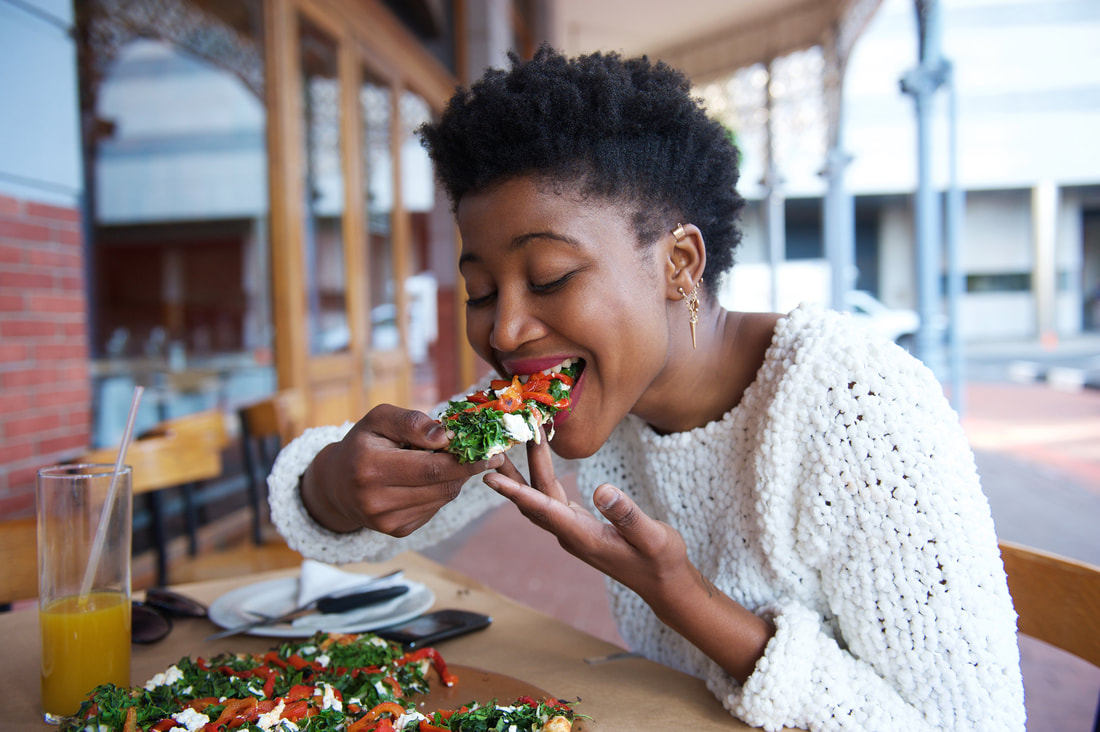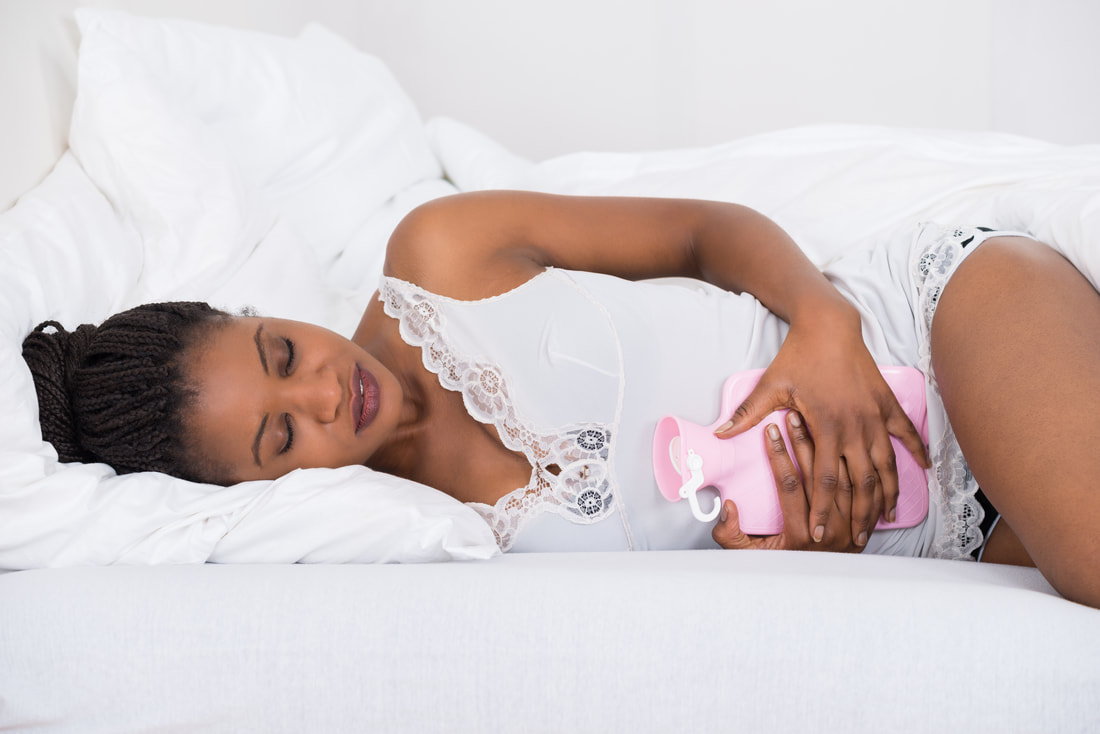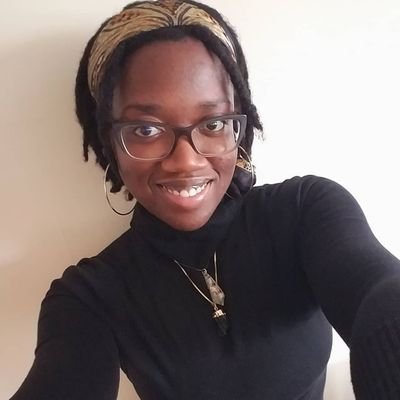 Me at 16 years old. Me at 16 years old. When I was 16 years old, my mom hired me a personal trainer. It was at a gym that I'd never been to before, though I was no stranger to exercise. At the time I was quite overweight, and I'd tried in earnest to do the things that I thought would address the problem, but I honestly had no clue what to do. Though I was a bit apprehensive, I embraced the idea of having someone with the experience and expertise to help me along my journey. It turned out to be one of the most embarrassing experiences of my life. I don't think he liked me much. Why? To this day I'm unsure. I don't want to assume that it was because I was an overweight Black teenaged girl, but I don't think it helped that we had absolutely nothing in common. He was a muscular white guy, probably in his late twenties or early thirties, and considering that we were in a wealthier, majority white neighborhood that I did not live in, he probably hadn't had many clients like me. I was quiet and shy, but I did everything that was asked of me, without complaint. The workout would begin with a strength circuit, silently jumping from machine to machine. He'd adjust the weights and I'd perform the movements. Next he'd bring me over to the dreaded stairs where I'd have to run up and down for what seemed like ages. These were the moments when my lack of fitness really came to the fore. Those stairs would leave me winded and I'd always feel like a pathetic mess after the fact. Once it was all over, he'd plant me on one of the treadmills, tell me to walk for a half hour, then leave. No praise, no discussion of how I'm improving, nothing. The moment of embarrassment, the moment when I decided that I sure as hell would not be renewing my contract once it was over, came during a review of my diet journal. As was requested of me, I kept a detailed journal (as detailed as a 16 year old could anyway) of the meals I ate during the day and presented it to him for review. One day, I proudly handed over my diet journal, pleased with how many salads I'd managed to eat, confident that he'd see my efforts and be thrilled. Wrong. He blew up at me. Within view and earshot of other patrons, my trainer yelled at me and accused me of trying to sabotage myself. I was confused until he asked why the hell I would be eating a beef patty, so high in saturated fat, when I was trying to lose weight. Now, at 16, I had no clue what the hell saturated fat was or why I should be avoiding it. As a matter of fact, I'd never had any nutritional counseling or education whatsoever. It wasn't something that was taught in school, and it wasn't something that my trainer had discussed with me. All I knew was that I should "eat better", and so I ate as well as I knew how. I ate salads when possible, and smaller amounts of everything else. But being of Jamaican descent and living in a Jamaican neighborhood, beef patties were ubiquitous, and it felt like such a normal and harmless thing to eat. I figured, hell, it's high in protein, right? Never in my wildest dreams did I think that having one beef patty would be such a problem. I was humiliated. I felt smaller than I had already been feeling throughout the process, the smallest I'd felt since the entire thing started. I struggled, but I managed to hold back tears until our training session was over. For a few more weeks, I would continue to go to my training sessions, and the tension between us never dissipated. Once the training package had run its course, I told my mother to save her money because I would not be going back. I would continue to struggle with my weight and my diet for many years after this, putting on much more weight than when I began. I was no better off for having had a trainer, and in some ways, in the emotional and mental ways, the ways that I now know matter the most, I was worse off. My confidence was shot, and I felt like a hopeless cause. I've heard many similar stories since then. Stories of people shelling out their hard earned cash to pay for training packages with trainers who were rude, dismissive, judgmental, and racially or culturally insensitive. Trainers who resorted to verbal and emotional abuse instead of providing support. Trainers who put their clients through the motions of working out without explaining why they were doing the things that they were doing, only that they must do it if they want to reach their goals. This kind of training was popularized on television shows such as The Biggest Loser where overweight and obese contestants were regularly yelled at, belittled, and broken down under the guise of building them back up stronger. Their bodies were put on display in disturbing weigh-ins where normal, healthy weight loss was treated as failure while losing huge, unrealistic amounts of weight was celebrated as a success. We now know that the long-term result of all of this was metabolic damage, not to mention any emotional and psychological pain that was endured. Shows like The Biggest Loser perpetuate the notion that people who are overweight and obese deserve to be abused and humiliated. That they must pay penance for daring to exist in their fat bodies. While there are plenty of reasons why everyone should eat healthier and get regular exercise, abuse, belittlement and judgment are not the ways to go about it. After years and years of jumping from gym to gym and tinkering with my diet, I was finally able to lose a substantial amount of weight on my own. But I resented the fact that I had to go it alone. I had to do extensive amounts of research in order to successfully navigate the clusterfuck of nutrition and fitness misinformation that's out there. Now, with fitness training and nutrition coaching certifications under my belt, I see much more clearly just how fucked up my experience has been. It shouldn't be this hard. It shouldn't be this difficult to take control of your own body. It shouldn't be this hard to be healthy. But this is the environment that we live in. Decades of processed food products being normalized as daily fare. A fast food restaurant on just about every corner. Convenience foods sold as viable substitutes for home-cooked meals because if you want to pay your rent you have to spend obscene amounts of time working, and who has time and energy to cook after working 40+ hours a week? Public health messaging that tells you that if you just move more, you'll lose more, and everything will be fine. Diet companies that profit off of nutritional ignorance by promising you that their particular brand of trash or their proprietary method of starvation is exactly what you need to eat to lose weight. A government that's been co-opted by industry lobbyists who purposely obscure any attempt to tell you the truth - that eating their addictive products is making you fatter and unhealthier, and no amount of exercise in the world can offset a poor diet. As a nation, we don't know how to properly eat and it's by design. We keep pretending like we don't know how obesity rates continue to rise, but the answer is right there, plain as day: as the majority of working people toil day in and day out to afford a living, they're forced to prioritize financial survival over self-care, health and wellness, and billion-dollar industries - from food to fitness to pharmaceuticals - profit off of that fact. People are kept confused on purpose, and when they slip up and find themselves in a poor state of health, the entirety of the blame is placed squarely on their shoulders. It's their fault for being misled, for being misinformed, for being unaware. This is a cop-out that will continue to exacerbate the spiraling health conditions that we're experiencing as a nation. There are too many people suffering to continue to categorize this as simply a matter of individual willpower. Because the needs of industry are placed above the needs of the people, people are forced to be extra discerning about who to trust when it comes to nutrition and fitness advice. It is unfortunate that there seem to be more entities concerned about making a dollar than making a difference. One scroll through Instagram will show you countless examples of "professionals" who approach fitness from a place of vanity and showmanship, who are themselves equally as misinformed about health and nutrition as the people they're trying to take on as clients. People deserve better. They deserve to be seen as individuals, to be understood for who they are in the context of the lives they've lived and the experiences they've had, not as stereotypes. They deserve to have their needs and concerns addressed in a manner that is understanding and empathetic, not judgmental and dismissive. They deserve proper guidance on how to live a cohesive lifestyle where movement is accessible, enjoyable, desirable and safe, rather than painful and punishing. They deserve to be able to enjoy food confidently, knowing they've been armed with the knowledge necessary to make healthy decisions for themselves and their families. Unfortunately, I don't envision that the billion-dollar industries that profit from poor health will all of a sudden gain a conscience. Nor do I see our elected officials deciding to put their financial positions at stake by facing these industries head on. Change has to begin at the bottom. Until enough fitness and wellness professionals take it upon themselves to ensure that they're providing their clients with proper knowledge and treating them with the respect that they deserve, people will continue to fall prey to the well-established, insidious traps of diet and fitness fads.
6 Comments
When I decided for the second time to adapt a plant-based diet, I did tons of research on the health effects of eating meat and dairy, and so much of what I came across was extremely disturbing. Take for example, the fact that heart disease, the world's leading cause of death, may actually start in the womb. Or the fact that consumption of animal foods are directly correlated with the development of heart disease, while plant foods are protective. I thought back to the copious amounts of cheese, eggs, pork and chicken I ate over the course of my life and knew that I had to reverse the early stages of heart disease that had been building since childhood.
This was just the tip of the iceberg, but the more I learned, the more I knew that I could never, ever go back to eating animal foods. But I did start to worry about people I know who still eat a standard American cheese, egg & meat-heavy diet. It's something that's discussed often within plant-based circles, the stress of submerging our concern for loved ones who we know would greatly benefit from changing their diet. We don't want to be that asshole who bombards people with unsolicited nutrition advice. Or we know that if we say something, we'll inevitably be subjected to a vicious verbal backlash. So we say nothing, and let them be. But it can be painful as hell to watch people you care for continue to harm themselves with the foods they eat. Lately, my husband and I have come to realize that because we're both pushing 30, we're only a few years away from watching people we know succumb to diseases that are largely linked to what's on their plate. I honestly feel a certain level of urgency to speak up more frequently and more loudly about how important it is to take diet seriously, and with all the available scientific and anecdotal evidence regarding the protective benefits of plant food, I need to be a more enthusiastic advocate. According to the CDC, 48% of African American women have some form of cardiovascular disease. While 7.6% of Black women have full-blown heart disease, many more have heart disease and aren't aware of it, largely because there are often no real serious symptoms until it's too late. A whopping 64% of women who die from heart disease have no previous symptoms at all. As a Black woman, I sometimes get frustrated. While there's a lot of talk about the stresses we experience as a demographic, and lots of vague discussions about the importance of self-care, there isn't nearly enough discussion about the importance of nutrition. Maybe it's a lack of knowledge, and if that's the case then I hope that this can help fill that void. It isn't stress that's killing us, it's heart disease, and while stress can absolutely pull the trigger, our weakened, congested arteries are the loaded gun. This isn't to give any credence to the all too common stereotype that Black women are fat, lazy and unhealthy, because not only is this ridiculous, it ignores the fact that people of other races and genders are all living lifestyles that contribute heavily to heart disease, and they, too are dying from it. However, I do want to shed light on a sad truth: heart disease is ravaging the world and as Black women, we're uniquely positioned to not only develop the disease, but to also die prematurely from it. We speak often about the medical neglect that Black women are all too often subjected to, precisely because of the negative stereotypes that are rife within the medical field. One most recent example is the case of Serena Williams' birthing scare, which helped to further highlight longstanding racial disparities in maternity deaths. I know from personal experience what it's like to go to the doctor and not be treated for my symptoms, but for whatever my doctor thinks must be wrong with me purely because I am a Black woman. This has happened on countless occasions. Sometimes it really does feel like we're the only ones who seem to take our emotional and physical pains seriously. I say all this because, while I do believe that more individuals in general could benefit from taking control of their health, I think this is even more true for Black women. We've learned too many times before that being our own advocates is a matter of life and death. We have to begin and sustain a serious conversation about preventing poor health in the first place, and all of my research has convinced me that change must start on the plate. The risk factors for heart disease are high blood pressure, high cholesterol, smoking, overweight/obesity, physical inactivity, and diabetes. According to the most recent available NIH statistics, 37% of Black women have high blood pressure, 20% of Black women smoke, almost 50% of Black women have high cholesterol, nearly 80% are overweight or obese, and 55% are physically inactive. While there are lots of initiatives that overtly teach the public how to quit smoking and how to start exercising, there's a lot of tip-toeing around the dietary aspects of these diseases. Even the most well-meaning, health conscious woman can fall victim to these illnesses, because our food landscape can be somewhat of a minefield. You might be trying to avoid sodium because of your blood pressure, but you might not know that your chicken has already been injected with salt. You might be eating less red meat, but it might not be making much of a difference. As a matter of fact, Dr. Kim Williams, former president of the American College of Cardiology, explains that his switch to a plant-based diet came when his supposedly healthy boiled, no-skin chicken diet led to his own high cholesterol. I'm going to be quite clear because I wouldn't forgive myself if I did the same kind of half-assed tip-toeing that we find in the media and other public health initiatives. The only scientifically proven way to prevent and even reverse heart disease is via a vegan, plant-based diet. It's one of those things where there's no half-stepping. Vegetarianism isn't the answer either, because eggs and cheese also contribute to heart disease. I write this not just for older Black women who are suffering from high blood pressure or cholesterol, but also for those my age who think they're invincible because there are no real signs that anything is wrong. Sometimes the first sign that something is wrong is death. This is my plea, from a place of love, for us to start prioritizing this particular type of self-care, where we feed our bodies with whole plant foods that nourish us, fortify us and build us up, not break us down - because the world does more than enough to try to break us down already. It was a particularly humbling bout of menstrual cramps that first inspired me to go vegan. It was a couple months after the Presidential election, and despite living a life of physical activity and perceived dietary moderation, I was gaining weight, and was more depressed than I'd ever been. That month, when my period arrived, it was nothing short of horrific. I've had terrible menstrual cramps and a multitude of accompanying symptoms for as long as I've been menstruating. I've been in and out of doctor's offices, and I've tried a number of supposed solutions that just didn't work on me. After jumping on a sustained fitness regimen a couple years ago, my period did begin to improve, which is why I was shocked when, shortly after the election, my period began to get worse. I felt absolutely defeated, like no matter what I tried, I was destined for a life of misery.
Some of you reading can relate to what I'm about to illustrate, but others are skeptical and wondering if this is all hyperbole. I've heard plenty of men and women alike express sentiments that seek to downplay and minimize just how horrible of an experience menstruation can be for some of us. However, it's a serious and costly medical issue that greatly impacts the livelihoods and well-being of women around the globe. This is my personal experience, and I'm being open in hopes of reaching those who have had to endure the same struggle. Whenever I read a list of common period symptoms I laugh, because I've had them all. Debilitating pain that radiated down into my thighs, pounding headaches, back aches, diarrhea, appetite-zapping nausea, acne, bloating, up to ten lbs of water retention, irritability, anxiety, deep depression that would begin an entire week beforehand, heavy bleeding that made me run through pads like crazy, and clots that would make me beg for mercy. I'd gotten used to the episodes of sitting on the toilet for well over an hour, quite literally wishing for death, because it felt like the only thing that could save me in the moment. After it all finally passed, I would retreat to my bed and stay there for a couple hours until my body led me right back to the bathroom. I lost count of how many doctors I've visited over the years. The diagnosis was always "dysmenorrhea", but the prescription would vary. Sometimes it was for stronger painkillers, sometimes it was birth control. I attempted birth control on three separate occasions and all three times were nothing short of a hot mess. The first time, after a couple weeks of not feeling quite right, I received a call from my doctor informing me that my blood test results revealed that my liver enzymes were through the roof, and that I should stop the pills until we could figure out what was going on. By the time I was able to get back on the pills, I had a whole new doctor with a whole new approach. She suggested that I skip the week of placebo pills that come with every pack so that I would only bleed every three months or so. I was elated. No period for three months? Four periods a year? It sounded like heaven, so of course I tried it. Except, when I finally allowed my body to bleed, I bled for about two weeks straight. At that point, I felt so defeated that I gave up altogether, or so I thought. My period continued to be hell, and a couple years later, I found myself back in the doctor's office, ready to give birth control another try. After a very short and concerning visit where the doctor was rushing out to another engagement (she didn't even look at my medical history, she just wrote a prescription), I was back on the pills. Once again, the pills didn't help my period, and to make matters worse, they made me feel completely numb. I couldn't feel any emotions other than numbness and depression. It was bad enough that I had already struggled with depression, but these pills made me feel like a shell of myself. I was existing, but I wasn't all there. Eventually, I decided to stop them. Funny enough, the physical pain wasn't the worst thing about my period. Don't get me wrong, the pain was nothing short of breathtaking. I popped OTC pain pills like candy (which made me nervous - what were they doing to my body?), and they often didn't work. Because of this, I developed a tolerance to pain that I began to wear as a badge of honor. It was the impact on my self-esteem, however, that really fucked me up. I felt like a deficient human being. How can I work, how can I be a productive member of society if I can't go a month without being bedridden for several days? My attendance throughout high school wasn't great. In college, every semester I exceeded my allotted absences for all of my classes, forcing me to go to the doctor just to get a note. Up until I got a job where I could work from home, I would miss days of work, meaning I was losing money. More painful though, was missing countless birthday celebrations for people I loved dearly. Even though they understood, I never shook the feeling of guilt that would overwhelm me whenever I couldn't be there. I tried everything. When the medical establishment didn't come through, I tried all the alternative, natural solutions that I had access to. Nothing seemed to work. So honestly, I wasn't expecting much when I decided to go vegan, but I felt like I had nothing to lose. I was concerned that my monthly pain was a signal that things could only get worse for me. Being a Black woman with a family history of uterine fibroids, breast cancer, and other hormone-related illnesses, I worried that I was destined for the same fate. I knew my hormones were way out of whack, I knew my body was inflamed, and I knew that something had to give. I was also just so damn tired. I couldn't imagine continuing to live this way for several more decades. Something had to change, so I changed myself. Considering the research regarding PMS and inflammation, research regarding the relationship between meat and dairy consumption and inflammation, as well as research surrounding estrogen consumed from meat and dairy, I decided to try a plant-based diet. After all, what did I have to lose? Literally two weeks after removing meat from my diet (dairy had removed itself many months before; my body couldn't handle it), I had what was, up until then, the best period of my life. The month before that, I was maxing out on ibuprofen, but a couple weeks after going vegan, I didn't have to take a single pain pill. I was floored. It wasn't completely pain-free, but it was such a drastic improvement on what I'd gotten used to that I was more annoyed than pained. But even more shocking was, every single month since then, my period has gotten better. My flow is now lighter (both in amount & hue - it's brighter!), my period is shorter, and my cramps are damn near non-existent. I would call it a miracle if I didn't know just how much work went into getting to this point. Understand, I didn't just "go vegan". I was particularly careful to ensure that I was eating a whole foods, plant-based diet. I've also incorporated foods that help to balance my hormones, reduce my overall inflammation, and nourish my body with vital nutrients & minerals. I realize now that the foods I grew up eating had put my body in such an unhealthy state that the only way I could get better was by being vigilant about exactly what I put in body. I had to take steps that I was honestly unwilling to take before. In addition to removing meat, dairy and eggs from my diet completely, I rarely eat fried food anymore. I eat tons of fruits and vegetables, and I increase my fruit intake right before my period. I keep processed food to a minimum - they're convenient in a pinch, but they tend to be full of additives that aren't good for you. I also recently removed alcohol from my diet, because honestly, it wasn't doing me any good. Consistent physical activity is also important. My current regimen has me working out 5-6 days a week, but even 3 days a week of moderate to vigorous exercise can help. The short amount of time in which my body responded and the continued improvements in the months after have made me a believer. You can find lots of articles and documentaries about the links between animal-based foods and major illnesses such as diabetes, heart disease and cancer, but a lack of scientific attention to menstrual issues means there aren't very many studies about the connection between diet and feminine health. I'm writing this to add to the growing anecdotal evidence that shows that what you put in your body is directly related to the pain and other horrific symptoms that come every month. My quality of life is the best that it's ever been, and the confidence and self-esteem boost that comes with knowing that I'm in control of my body rather than my body being in control of me is absolutely priceless. My Personal Go-To Menstruation Staples Here are some staples that I include in my diet to help with my menstruation issues. I suggest doing your own research before incorporating anything new or unfamiliar into your diet. It took a lot of trial & error to come to a set of staples that work for me.
There are many other foods and herbs that are reported to work that may be more accessible or preferable to you. Keep in mind that your experience may not be the same as mine. Depending on the state of your body, the response might be immediate or it may take a few months. Give yourself time and be patient with your body. It's worth it in the end. |
AuthorMy name is Nivea, but you can call me Niv. I'm an independent Plant-Based Nutrition & Fitness Coach hailing from the Bronx, NY. Archives
August 2021
Categories
All
|




 RSS Feed
RSS Feed